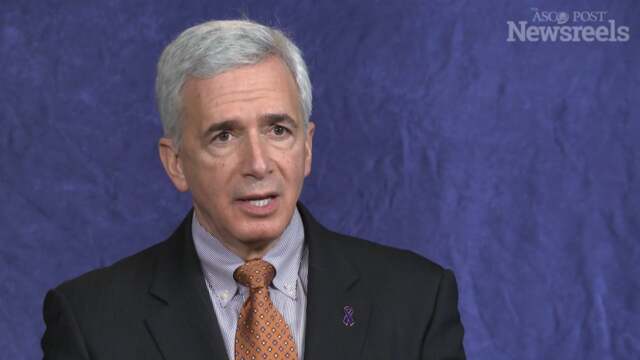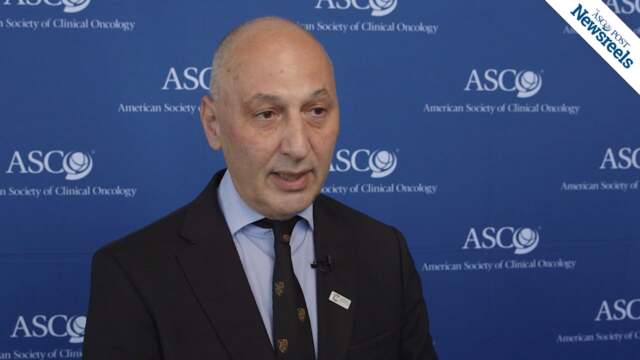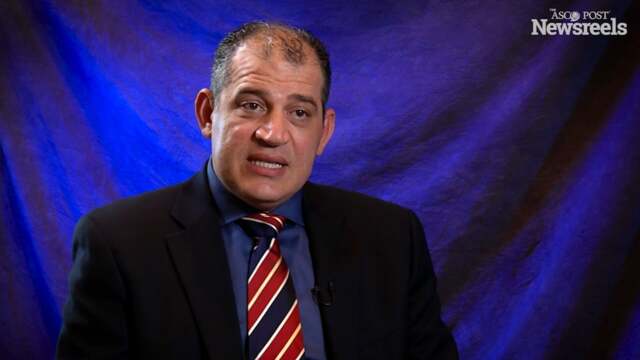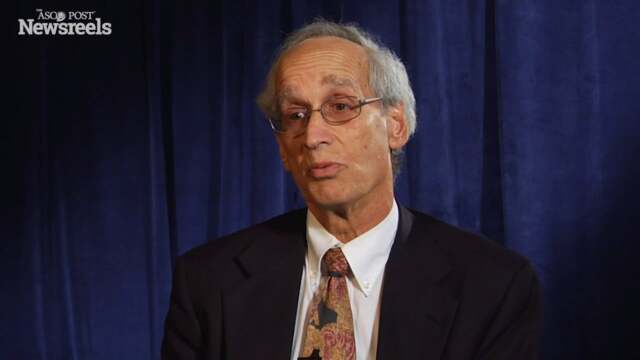First-in-Class Rovalpituzumab Tesirine in Recurrent Small Cell Lung Cancer
In a phase I study reported in The Lancet Oncology, Charles M. Rudin, MD, of Memorial Sloan Kettering Cancer Center, and colleagues found that rovalpituzumab tesirine, a first-in-class antibody-drug conjugate directed against delta-like protein 3 (DLL3), produced responses in patients with...
Circulating Tumor DNA as a Prognostic Marker in Pancreatic Cancer
Translational research in pancreatic adenocarcinoma has been limited by the difficulty of obtaining sufficient quality and quantity tumor tissue from patients. A study by Pietrasz et al assessing the feasibility and prognostic value of circulating tumor DNA (ctDNA) in pancreatic adenocarcinoma has...
‘Collateral Lethality’ May Offer New Therapeutic Approach to Cancers of the Pancreas, Stomach, and Colon
Cancer cells often delete genes that normally suppress tumor formation. These deletions also may extend to neighboring genes, an event known as “collateral lethality,” which may create new options for the development of therapies for several cancers. Scientists at The University of Texas MD...
Study Finds Addition of Adjuvant Capecitabine to Gemcitabine Improves Survival in Resected Pancreatic Cancer
In the European phase III ESPAC-4 trial reported in The Lancet, Neoptolemos et al found that adding adjuvant capecitabine to gemcitabine significantly improved overall survival in patients with resected pancreatic cancer. Study Details In the open-label trial, 730 patients from 92 hospitals in...
Sarah E. Hoffe, MD, on Pancreatic Cancer and SBRT: Pros and Cons
Sarah E. Hoffe, MD, of the Moffitt Cancer Center, discusses the controversial role of radiation in the treatment of pancreatic cancer, recent advances in delivering short courses of high-dose stereotactic body radiation therapy, and how best to integrate this new modality in borderline and locally advanced disease.
Eileen M. O’Reilly, MD, on Pancreatic and Hepatobiliary Cancers: Selecting High-Impact Targets
Eileen M. O’Reilly, MD, of Memorial Sloan Kettering Cancer Center, discusses a range of topics, including tyrosine kinase inhibitors, immune therapies, targeted approaches, and DNA damage repair strategies.
Mark Talamonti, MD, on Pancreatic Cancer: Minimally Invasive Resection
Mark Talamonti, MD, of NorthShore University Health System, discusses the technical prerequisites for minimally invasive surgery in pancreatic cancers and the potential benefits to patients.
Circulating Tumor DNA May Serve as a Prognostic Marker in Pancreatic Cancer
Translational research in pancreatic adenocarcinoma has been limited by the difficulty of obtaining sufficient quality and quantity tumor tissue from patients. A study by Pietrasz et al assessing the feasibility and prognostic value of circulating tumor DNA (ctDNA) in pancreatic adenocarcinoma has...
Recent Progress and Concepts in Pancreatic Cancer
November is National Pancreatic Cancer Awareness Month, the impetus for this article. Pancreatic cancer is a huge health challenge. It's the eighth most common cancer in the United States and the fourth most common cause of cancer deaths but is expected to become the second most common cause of...
Impact of Neoadjuvant Therapy on Survival in Resectable Pancreatic Cancer
In a propensity score–matched analysis of National Cancer Database data reported in the Journal of Clinical Oncology, Mokdad et al found that neoadjuvant therapy followed by resection was associated with a survival benefit vs upfront resection. Patricio M. Polanco, MD, of the Division of Surgical...
Let’s Win: Innovative Online Community Offers Guidance to Patients With Pancreatic Cancer and Their Families
Let’s Win is an online community for persons with pancreatic cancer (www.letswinpc.org), but it is far more than a typical support group. Let’s Win propels interested users toward cutting-edge research, based on its founders’ commitment that no patient with pancreatic cancer should settle on the...
Vaccines May Boost Immune Responsiveness of Pancreatic Tumors
Pancreatic cancer has been notably unresponsive to immunotherapeutic approaches, but a Stand Up 2 Cancer Dream Team believes their research can change that. Team co-leader Elizabeth Jaffee, MD, Deputy Director of the Sidney Kimmel Comprehensive Cancer Center at Johns Hopkins University, Baltimore, ...
Scientists Are Boosting Immune Responses in Pancreatic Tumors
The successes observed with various immune oncologic treatment approaches have largely bypassed pancreatic cancer, but this may be about to change, based on emerging insights into how and why these tumors evade attacks by T cells. At the 2nd International Cancer Immunotherapy Conference, two...
Precision Promise Clinical Trial Focuses on Precision Medicine, Collaboration, and Data-Sharing in Pancreatic Cancer
The Pancreatic Cancer Action Network recently announced Precision Promise, the first large-scale precision medicine trial designed to transform outcomes for patients with pancreatic cancer. The organization also announced the 12 initial Precision Promise Clinical Trial Consortium sites selected to...
Analysis Indicates Survival Advantage With Neoadjuvant Therapy in Resectable Pancreatic Cancer
In a propensity score–matched analysis of National Cancer Database data reported in the Journal of Clinical Oncology, Mokdad et al found that neoadjuvant therapy followed by resection was associated with a survival benefit vs upfront resection. Study Details The analysis included adults...
Comparison of Second-Line Treatments in Advanced Pancreatic Cancer After Gemcitabine-Based Chemotherapy
In the Canadian phase III PANCREOX trial reported in the Journal of Clinical Oncology, Gill et al found no benefit of modified FOLFOX6 (infusional fluorouracil [5-FU], leucovorin, and oxaliplatin) vs infusional 5-FU/leucovorin as second-line treatment in patients with advanced pancreatic cancer who ...
Overall Survival With Everolimus in Advanced Pancreatic Neuroendocrine Tumors in the RADIANT-3 Trial
As reported by Yao et al in the Journal of Clinical Oncology, the final overall survival analysis from the phase III RADIANT-3 trial showed a median survival of 44.0 months among patients with advanced pancreatic neuroendocrine tumors initially randomized to receive everolimus (Afinitor, Zortress)...
AACR, Pancreatic Cancer Action Network Awards Research Grants to Early-Career Investigators
The American Association for Cancer Research (AACR) and the Pancreatic Cancer Action Network awarded nine grants to outstanding scientists who will undertake novel research in the field of pancreatic cancer. “By recruiting the brightest scientists with the most novel ideas, we continue to build a ...
ASCO Guideline on Metastatic Pancreatic Cancer
As reported in the Journal of Clinical Oncology by Davendra P.S. Sohal, MD, MPH, of Cleveland Clinic, and colleagues, ASCO has released a clinical practice guideline on the treatment of patients with metastatic pancreatic cancer.1 Recommendations are based on an expert panel systematic review of...
ASCO Guideline on Treatment of Locally Advanced, Unresectable Pancreatic Cancer
As reported by Edward P. Balaban, DO, FASCO, of Penn State Hershey Cancer Institute, and colleagues in the Journal of Clinical Oncology, ASCO has released a clinical practice guideline on the treatment of locally advanced, unresectable pancreatic cancer.1 The recommendations are based on expert...
ASCO 2016 Guidelines for the Treatment of Pancreatic Cancer: Why Another Guideline?
The 5-year survival rate of those diagnosed with pancreatic cancer remains stubbornly fixed around 5%. Even in the 20% of cases in which surgical resection is undertaken for curative intent, the 5-year survival rate after surgery is 20% to 30%. As we make progress in other cancers with decreasing...
ASCO Guideline on Potentially Curable Pancreatic Cancer
As reported in the Journal of Clinical Oncology by Alok A. Khorana, MD, of Cleveland Clinic, and colleagues, ASCO has released a clinical practice guideline on the treatment of potentially curable pancreatic cancer.1 The recommendations are based on an expert panel systematic review of the...
Precision Medicine Clinical Trial for Metastatic Pancreatic Cancer Now Open at Multiple Sites
The first clinical trial to compare standard-of-care chemotherapy with molecularly tailored therapy (also known as precision medicine) for metastatic pancreatic cancer is now enrolling patients at multiple sites around the country. Patients who have been treated with one round of chemotherapy for...
Treatment Update in Gastric, Pancreatic, and Colorectal Cancers
Although new gastrointestinal cancers are on the rise, advancements in their treatment, as well as the upcoming results of perioperative trials, could prove to be “clinical practice game-changers,” declared Thomas J. George, Jr, MD, FACP, at the 2016 Community Oncology Conference in Orlando,...
Japanese Trial Shows Improved Survival With Adjuvant S-1 vs Gemcitabine in Resected Pancreatic Cancer
Updated results of a Japanese phase III trial (JASPAC 01) reported in The Lancet by Uesaka et al showed that adjuvant S-1 was associated with significantly better overall survival compared with gemcitabine in patients with resected pancreatic cancer. Study Details In the open-label noninferiority ...
ASCO Releases Clinical Practice Guideline on Metastatic Pancreatic Cancer
As reported in the Journal of Clinical Oncology by Davendra P. Sohal, MD, MPH, of Cleveland Clinic, and colleagues, ASCO has released a clinical practice guideline on the treatment of patients with metastatic pancreatic cancer. Recommendations are based on expert panel systematic review of the...
ASCO Releases Clinical Practice Guideline on Treatment of Locally Advanced, Unresectable Pancreatic Cancer
As reported by Edward P. Balaban, DO, of Penn State Hershey Cancer Institute, and colleagues in the Journal of Clinical Oncology, ASCO has released a clinical practice guideline on the treatment of locally advanced, unresectable pancreatic cancer. The recommendations are based on expert panel...
ASCO Releases Clinical Practice Guideline on Treatment of Potentially Curable Pancreatic Cancer
ASCO has released a clinical practice guideline on the treatment of potentially curable pancreatic cancer, as reported by Alok A. Khorana, MD, of Cleveland Clinic, and colleagues, in the Journal of Clinical Oncology. The recommendations are based on expert panel systematic review of the literature...
Adjuvant Chemotherapy Improves Survival in Pancreatic Cancer
An adjuvant chemotherapy regimen improved overall survival in early-stage pancreatic cancer patients, in the large phase III European ESPAC-4 study reported at the 2016 ASCO Annual Meeting.1 The combination of gemcitabine and capecitabine almost doubled the 5-year survival rate, compared to...
ASCO 2016: Rucaparib Shows Clinical Benefit in BRCA-Mutated Pancreatic Cancer
The targeted PARP inhibitor rucaparib, which has demonstrated robust clinical activity in patients with ovarian cancer who have a BRCA mutation, also showed promise in previously treated patients with pancreatic cancer who have the mutation, according to results from a phase II clinical study...
John P. Neoptolemos, MD, PhD, on Pancreatic Ductal Adenocarcinoma: Results of the ESPAC-4 Trial
John P. Neoptolemos, MD, PhD, of the University of Liverpool, discusses findings from this international phase III study of adjuvant combination chemotherapy: gemcitabine and capecitabine vs monotherapy gemcitabine in patients with resected pancreatic ductal adenocarcinoma (Abstract LBA4006).
ASCO 2016: Adding Capecitabine Chemotherapy to Gemcitabine Extends Survival After Pancreatic Cancer Surgery
For a more in-depth look at these data, as well as commentary, click here. A European phase III trial, one of the largest ever conducted in pancreatic cancer, showed that adding the oral drug capecitabine chemotherapy to gemcitabine prolongs survival without increased toxicity. Adjuvant...
No Survival Benefit Reported With Chemoradiotherapy vs Continued Chemotherapy in Controlled Locally Advanced Pancreatic Cancer
In the phase III GERCOR LAP07 trial reported by Pascal Hammel, MD, of Beaujon Hospital, Clichy, France, and colleagues in JAMA, there was no survival benefit of chemoradiotherapy vs continued chemotherapy in patients with locally advanced pancreatic cancer controlled after 4 months of gemcitabine...
Prolonged Survival Reported With First-Line FOLFIRINOX in Locally Advanced Pancreatic Cancer
First-line FOLFIRINOX (leucovorin, fluorouracil, irinotecan, oxaliplatin) is associated with median overall survival of approximately 2 years in patients with locally advanced pancreatic cancer, according to a systematic review and patient-level meta-analysis reported by Suker et al in The Lancet...
NCCN Clinical Practice Guidelines in Oncology (NCCN Guidelines®): 2016 Guidelines
In 1996, the National Comprehensive Cancer Network (NCCN®) published its first set of Clinical Practice Guidelines in Oncology® (NCCN Guidelines®), covering eight tumor types. The NCCN Guidelines® are now published for more than 60 tumor types and topics. Some of the key updates for 2016 were...
No Survival Benefit Reported With Chemoradiotherapy vs Continued Chemotherapy in Controlled Locally Advanced Pancreatic Cancer
In the phase III GERCOR LAP07 trial reported in JAMA by Hammel et al, there was no survival benefit of chemoradiotherapy vs continued chemotherapy in patients with locally advanced pancreatic cancer controlled after 4 months of gemcitabine with or without erlotinib (Tarceva). Study Details In...
Study Finds Benefit of Surveillance for Pancreatic Cancer in High-Risk Individuals
As reported by Vasen et al in the Journal of Clinical Oncology, surveillance for pancreatic ductal adenocarcinoma in high-risk individuals appears to be of benefit in individuals at risk due to CDKN2A mutation, with the advantage being less clear among individuals at risk due to familial clustering ...
Assessing the Accuracy and Readability of Online Health Information for Patients With Pancreatic Cancer
Online information on pancreatic cancer overestimates the reading ability of the overall population and lacks accurate information about alternative therapy, according to a study published by Storino et al in JAMA Surgery. The degree to which patients are empowered by written educational materials ...
AACR 2016: Certain Oral Bacteria May Be Associated With Increased Pancreatic Cancer Risk
The presence of two species of bacteria linked to periodontal disease in the mouths of healthy individuals was associated with an increased risk of subsequently developing pancreatic cancer, according to research presented by Fan et al at the 2016 AACR Annual Meeting (Abstract 4350). ...
CCR2 Inhibitor Active in Combination With FOLFIRINOX in Advanced Pancreatic Cancer
A CCR2 inhibitor (PF-04136309) was active in combination with FOLFIRINOX (oxaliplatin, irinotecan, leucovorin, fluorouracil) in treatment-naive patients with borderline resectable or locally advanced pancreatic ductal adenocarcinoma, according to a single-center phase Ib study reported by Nywening...
Phase Ib/II Study Reports High Response Rates Seen With Addition of Cisplatin to Regimen for Advanced Pancreatic Cancer
The oncology research team at HonorHealth Research Institute in Scottsdale, Arizona, is spearheading a phase Ib/II trial that is demonstrating promising results with a novel regimen in patients with advanced pancreatic cancer. “The patients we are treating have advanced adenocarcinoma of the...
Mahmoud Al-Hawary, MD, on Pancreatic Cancer: The Role of Imaging
Mahmoud Al-Hawary, MD, of the University of Michigan Comprehensive Cancer Center, discusses the role of radiology in diagnosing and staging pancreatic tumors, optimizing imaging techniques, and the value of structured reporting.
Meta-analysis of Gene-Expression Datasets Identifies Novel Five-Gene Pancreatic Cancer Classifier
Pancreatic cancer is often diagnosed at a late stage, when curative treatment is no longer possible. A team led by investigators at Beth Israel Deaconess Medical Center (BIDMC) identified and validated an accurate five-gene classifier for discriminating early pancreatic cancer from nonmalignant...
‘Know Your Tumor’ Program Aids Patients With Pancreatic Cancer
Patients with pancreatic cancer can obtain molecular tumor profiling through the Pancreatic Cancer Action Network’s Know Your TumorSM precision medicine initiative, a partnership with Perthera, a personalized medicine service company that facilitates the multi-omic profiling and generates the...
Chemotherapy Preferable to Radiotherapy to Reduce Distant Pancreatic Cancer Recurrences
Patients who received chemotherapy after surgical resection of pancreatic cancer have fewer distant disease recurrences and longer overall survival than those who also had adjuvant chemoradiation therapy. While a course of radiotherapy in addition to chemotherapy and a cancer operation reduced the...
Optimizing Outcomes in Pancreatic Cancer
Evidence has long supported a volume-outcome relationship for surgical resection of pancreatic cancer, yet surgery alone is not enough to prolong survival in patients with localized disease. James L. Abbruzzese, MD, of Duke University and Duke Cancer Institute, Durham, North Carolina, discussed his ...
Study Finds Mechanism by Which Obesity Promotes Pancreatic and Breast Cancers
Massachusetts General Hospital (MGH) investigators may have uncovered a novel mechanism behind the ability of obesity to promote cancer progression. In their report published by Incio et al in Clinical Cancer Research, the research team describes finding an association between obesity and an...
Preclinical Device Hits Pancreatic Tumors With Drug Cocktail, Sparing the Body
A highly lethal cancer sometimes requires large doses of highly toxic drugs. However, a blitzkrieg approach can be unfeasible for some patients due to severe side effects. Now a team of researchers at the University of North Carolina at Chapel Hill has found that an implantable device can deliver a ...
Samuel M. Silver, MD, PhD, and Margaret A. Tempero, MD, on Multidisciplinary Management of Pancreatic Cancer
Samuel M. Silver, MD, PhD, of the University of Michigan Comprehensive Cancer Center, and Margaret A. Tempero, MD, of the UCSF Helen Diller Family Comprehensive Cancer Center, discuss drugs developed for hematologic malignancies that have activity in pancreatic cancer, vaccines, neoadjuvant treatment, and the need to focus on activated RAS.
Joel E. Tepper, MD, on Radiotherapy in Liver and Pancreatic Cancers
Joel E. Tepper, MD, of the University of North Carolina School of Medicine, discusses the ways in which SBRT has changed radiotherapy, as demonstrated in key studies presented at this year's meeting on stereotactic body radiotherapy for liver metastases and hepatocellular carcinoma, and borderline resectable and unresectable pancreatic tumors (Abstracts 253, 255, 351, 357).







